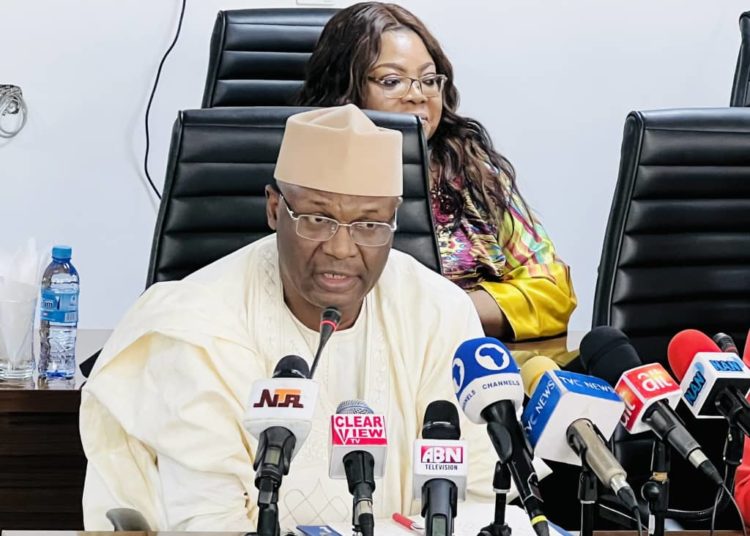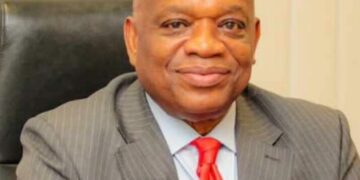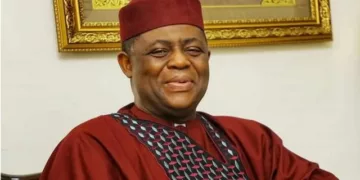The Independent National Electoral Commission (INEC) has said that it will scrupulously apply the laws, particularly the Electoral Act, 2022 without fear or favour to ensure free, fair, credible, inclusive and transparent elections in 2023.
The electoral body insisted that it was imperative for all stakeholders, especially the political parties to note the major features introduced by the new Electoral Act 2022 and the possible implications of those changes on the upcoming elections.
INEC chairman, Prof. Mahmood Yakubu, disclosed this at the 4th Abubakar Momoh Memorial Lecture with the theme, “Electoral Act 2022: Imperatives for Political Parties and the 2023 General Election,” in Abuja on Wednesday.
The helmsman of the Commission identified some of the critical changes brought up by the new electoral law to include: the conduct of early party primaries, technological changes in the electoral process, the commission’s power to review the decision of returning officers, and over-voting based on the number of accredited voters.
Represented by the chairman of the Board of Electoral Institute, Abdullahi Zuru, the INEC chairman assured that the umpire has no preferred party or candidate and it shall only ensure that valid votes count and the winners are decided solely by the voters.
“The use of electronic devices such as Bimodal Voters Accreditation System (BVAS), INEC Voter Enrolment Device (IVED), INEC Results Viewing Portal (IRev), and other technological devices, are now legally allowed in the accreditation process for voters, collation of results and in the general conduct of elections.
“Please be assured that these innovations are intended to deepen the Electoral process in our country and their optimal performance in the just concluded gubernatorial election in Ekiti and Osun States is an eloquent testimony to their electoral value. We shall only do more to consolidate their deployment in our election,” he said.
He expressed hope that the political parties would be committed to ensuring that the 2022 general election is “devoid of deliberate infractions to the 2022 Electoral Act, essentially by allowing the electoral process to run smoothly thereby, growing a rich democratic culture and acceptable election outcome.”
Yemi Akinseye-George, the guest speaker, posited that politics is not anarchy and a game of disorderliness.
According to him, “Politics is no anarchy; it is not disorderliness; it must be punctuated by justice, fairness and orderliness.”
The professor of law also stressed that politics must not be seen as a dirty game, expressing optimism that the 2023 general election would hold against all odds and citing the enthusiasm shown for voter registration as a pointer to the fact.
While insisting that political parties must obey their own rules, he said: “the Supreme Court has decided in several cases that political parties must obey their constitutions as the court will not allow them to act arbitrarily or as they like.”
Akinseye-George explained that the lecture focused on the political parties because they constitute the major pillar on which democracy is founded.
“Indeed, the success or otherwise of our democracy is directly related to the level of enlightenment and capability of the political parties to comply with the rule of law in their operations,” the scholar said.
He highlighted the constitutional provisions relating to political parties; nomination of candidates and political parties’ finances as provided for in the Electoral Act, 2022 as well as selected leading judicial pronouncements on political parties and elections.
Also speaking, the convener of Nigeria Civil Society Situation Room, a body of over 70 Civil Society Organisations (CSOs), Ene Obi, appealed to INEC to reopen the suspended Continuous Voter Registration (CVR) exercise at least for one month.
Obi noted that such a window would enable those willing to participate in the exercise but could not, due to technical and other glitches to register in order not to dissuade them from attempts to exercise their franchise.
She said: “The civil society organisations are advocating and appealing to INEC to reopen (registration) because a lot more want to register and we don’t want to shut down their enthusiasm. So, it is important that they reopen it even if it is for one month.
“More than 11 million of those who completed their forms online were unable to complete their registration. That means you are losing 11 million electorates. That’s whooping, and INEC should address it. We are still appealing that more of them can still register. They should open it even if it is a window of one month.”
Earlier, in his welcome remarks, the director general of the Electoral Institute, Sa’ad Idris, said the topic for this year’s lecture was carefully chosen considering the necessity and requirements for conducting the 2023 general elections under a new law (Electoral Act, 2022).
Idris said the discourse aims to look at the implications of the new electoral law for not only the Commission, but also, in particular, the 18 political parties that will be fielding candidates for the various elective offices in the next year’s polls.
He said, “This topic is also very apt, to train the Executives (National Chairman and Secretaries) of the 18 Political Parties on the various Sections of the new Act and the critical implications embedded in many of its Sections.
“The unfortunate preponderance of many legal cases arising even from the pre-election period up till after the conduct of the elections, indeed have at many times brought a lot of challenges to the electoral process and our country’s political development at large.”
He said that it is hoped that with this lecture and training for party executives, due influence can be brought to bear and reduce the swift race to the courts that has characterised the political space in the last 10 years.





